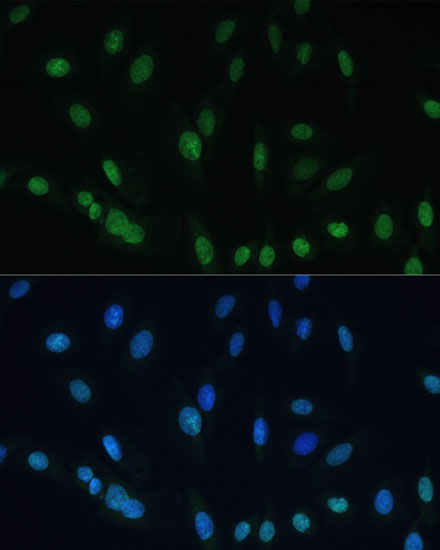Product Detail
Product NameHistone H2AX Rabbit Polyclonal Antibody
Host SpeciesRabbit
ClonalityPolyclonal
IsotypeIgG
PurificationAffinity purification
ApplicationsWB,IHC,IF
Species ReactivityHuman,Mouse,Rat
Immunogen DescA synthetic peptide of human Histone H2AX.
ConjugateUnconjugated
Other NamesH2A.X;H2A/X;H2AX;Histone H2AX;H2AFX;histone H2AX;gamma H2A.X;γH2AX
Accession NoSwiss Prot:P16104
GeneID:3014
Uniprot
P16104
Calculated MW15kDa
Sdspage MW15kDa
FormulationBuffer: PBS with 0.02% sodium azide,50% glycerol,pH7.3.
StorageStore at -20˚C. Avoid freeze / thaw cycles.
Application Details
WB 1:500 - 1:1000
IHC 1:50 - 1:100
IF 1:50 - 1:100
Immunofluorescence analysis of U-2 OS cells using Histone H2AX Polyclonal at dilution of 1:100 (40x lens). Blue: DAPI for nuclear staining.
Confocal immunofluorescence analysis of HeLa cells using Histone H2AX Polyclonal at dilution of 1:200. Blue: DAPI for nuclear staining.
Western blot analysis of extracts of various cell lines, using Histone H2AX at 1:1000 dilution.
Histones are basic nuclear proteins that are responsible for the nucleosome structure of the chromosomal fiber in eukaryotes. Two molecules of each of the four core histones (H2A, H2B, H3, and H4) form an octamer, around which approximately 146 bp of DNA is wrapped in repeating units, called nucleosomes. The linker histone, H1, interacts with linker DNA between nucleosomes and functions in the compaction of chromatin into higher order structures. This gene encodes a replication-independent histone that is a member of the histone H2A family, and generates two transcripts through the use of the conserved stem-loop termination motif, and the polyA addition motif.
If you have published an article using product 54667, please notify us so that we can cite your literature.
et al,2-Mercaptoethanol protects against DNA double-strand breaks after kidney ischemia and reperfusion injury through GPX4 upregulation. In Pharmacol Rep on 2022 Oct by Daeun Moon, Babu J Padanilam, et al..PMID: 35989399
, (2022),
PMID:
35989399
et al,AMBRA1 drives gastric cancer progression through regulation of tumor plasticity
, (2024),
PMID:





 Yes
Yes



